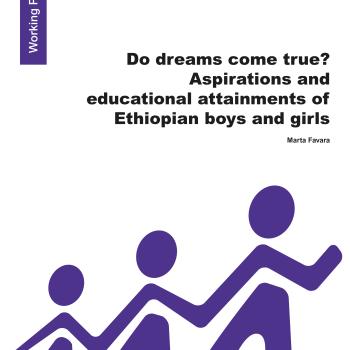
Most economic decisions that individuals take are forward-looking and are therefore shaped by the desire or ambition to achieve a goal. And yet, little is known about how aspirations shape decision-making. Our paper partially addresses this gap using a rich longitudinal dataset following a cohort of children in Ethiopia for over a decade between the age of 8 and 19. We investigate the role of early aspirations for human capital investments in a context of poverty, traditional social expectations and gender roles. More specifically, we focus on three related questions. First, we investigate the relation between aspirations and boys’ and girls’ educational attainment, as an indicator of cumulative investments in education. Second, we look at how parents and children form their aspirations and at the transmission of aspirations from one generation to the other. Third, we explore the gender-based bias in aspirations and we investigate whether an initial pro-boys aspiration bias might constitute a source of gender inequality perpetuation particularly in a context of extreme poverty.
We document that:
Aspirations have a strong predictive power for later educational attainment particularly for boys, who are more likely to drop out of school after the age of 15 There is a substantial gender gap in aspirations and steep gradient in aspirations across wealth Parents ground their aspirations on the expectations they have about their children’s future when they are 12 years old Children’s aspirations mirror parental aspirations Initial low aspirations might be a mechanism of perpetration of gender inequality among the poorest segment of the population Parents and children revise their aspirations over time adapting to external circumstance and social expectations, so that after the age of 15 the pro-boys gender bias in aspirations is reverted.

Most economic decisions that individuals take are forward-looking and are therefore shaped by the desire or ambition to achieve a goal. And yet, little is known about how aspirations shape decision-making. Our paper partially addresses this gap using a rich longitudinal dataset following a cohort of children in Ethiopia for over a decade between the age of 8 and 19. We investigate the role of early aspirations for human capital investments in a context of poverty, traditional social expectations and gender roles. More specifically, we focus on three related questions. First, we investigate the relation between aspirations and boys’ and girls’ educational attainment, as an indicator of cumulative investments in education. Second, we look at how parents and children form their aspirations and at the transmission of aspirations from one generation to the other. Third, we explore the gender-based bias in aspirations and we investigate whether an initial pro-boys aspiration bias might constitute a source of gender inequality perpetuation particularly in a context of extreme poverty.
We document that:
Aspirations have a strong predictive power for later educational attainment particularly for boys, who are more likely to drop out of school after the age of 15 There is a substantial gender gap in aspirations and steep gradient in aspirations across wealth Parents ground their aspirations on the expectations they have about their children’s future when they are 12 years old Children’s aspirations mirror parental aspirations Initial low aspirations might be a mechanism of perpetration of gender inequality among the poorest segment of the population Parents and children revise their aspirations over time adapting to external circumstance and social expectations, so that after the age of 15 the pro-boys gender bias in aspirations is reverted.

